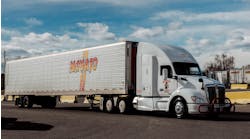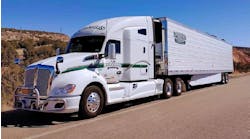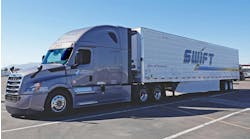Growing cold: Trucking partners build region-boosting cold storage
Doug Bowen and Darren Winstead were strangers in a strange new school when their roads first intersected in the fifth grade. Thirty years later, their bond is helping to unite their community—and aiding an entire industry.
And they refuse to leave anyone out of the cold.
“It’s more of a brotherhood than a friendship,” Winstead explained.
The long-time friends finally teamed as business partners in 2016, when Winstead joined Bowen in Arkansas-based Doug’s Produce—the refrigerated carrier Bowen started in 2003—and they had the opportunity to purchase 189 acres of undeveloped land in the Mulberry Industrial Park. And while brainstorming the best use of their blank canvas in the state the Arkansas Farm Bureau says leads the nation in poultry production, cold storage quickly emerged as the only option that could help grow their trucking business, provide much-needed capacity for chicken producers, and positively impact the region’s economy.
“Our whole goal is to help grow the city,” Bowen said.
“We were raised here, we’re raising our kids here, and we want to see our community flourish. That’s a big deal to us.”
To help make their refrigerated dreams a reality, the partners turned to family-owned Tippmann Innovation, also known as Ti Cold, to design and build a state-of-the-art public refrigerated warehouse. And after more than three years of planning, their newly formed Compass Cold Storage venture broke ground in April on a two-phase, nearly $50 million project that will create 143,000 sq. ft. of frozen and refrigerated space—and everyone is buying in, including Mulberry Mayor Gary Baxter, now one of their biggest supporters.
The new facility is expected to commence initial operations in April 2023.
“He’s been a great ally, helping us navigate the permitting and everything it takes from a city development side,” Bowen said.
Doug’s Produce
Bowen has trucking in his blood. His dad, Tommy Bowen, was a career small-fleet operator, never running more than five trucks because he loved driving more than dispatching. He put 6 million miles on his last truck, Bowen said. Bowen started Bowen Logistics, which does business as Doug’s Produce, as soon as he obtained his CDL, and then spent 10 years on the road. But after racking up nearly 2 million accident-free miles, his wife and kids needed him home more, so he brought in Winstead to help grow the business.
Today, 55 company drivers pilot the fleet’s 58 power units and 96 reefer trailers.
Seth Bland, director of operations, said they move 700 to 800 loads per month, mostly poultry in outbound lanes across the country, but also a small percentage of fresh produce. Backhauls include refrigerated and dry products, from seasoning to bottled water. Bland said they’ve added 20 trucks in his two years alone. “Doug and Darren have done a great job growing the business, and continuing to let us grow,” he said.
“That’s a big key. Our team is young, but also full of knowledge, so it’s just growing and applying that knowledge, and they’re letting us do that.”
Bland credits their success to the relationships they’ve built with customers—relationships they’re fortifying through diversification. “We’ve been aggressive, and everyday we’re challenging ourselves, and trying to push ourselves further,” Winstead said.
Branching out
Winstead’s background is in manufacturing. His parents started the first Industrial Park business, Mulberry Gate Company, in 1987. Winstead and his brother established Mulberry Industrial Powder Coating in 2007, and ran that company for several years, before Winstead joined Bowen in the trucking business. “The only thing I hated about the manufacturing business is you do the same stuff every day,” Winstead said.
“Trucking is completely opposite, so that was attractive to me.”
Through his many years in the park, Winstead knew about the available land owned by a holding company. At one point, owners sought to build a plant on the property, but plans changed under new ownership, and the operation moved out of state, he recalled. The land laid dormant for 14 years until Winstead, looking for ways to invest, started making phone calls, and he and Bowen eventually acquired the 189 acres through two separate purchases. Then they had to decide how to use the “distribution center-worthy” acreage.
“We’re still loading out of the same facilities my dad went to when I was going on runs with him 40 years ago,” Bowen said. “So the longevity of these cold storage facilities sparked our interest, and we started diving in deeper.” They soon realized how desperate were producers for additional local storage capacity—and how much money the region was losing shipping product out for storage, only to bring it back in later.
Once they settled on cold storage, they turned to Ti Cold for assistance, but still needed to secure financing for the pricey project, and their first contract fell apart when the COVID-19 pandemic hit, Bowen said. Fortunately, the global health scare also opened a new door. “Our current lender told us they wouldn’t have been able to talk to us before COVID,” he said. “That unlocked different spectrums of their lending capabilities.”
They finally broke ground for Phase I of Compass Cold on April 20—more than three years after envisioning the facility—with 300-plus people in attendance. They hoped to start hanging steel and raising walls in November. Phase II “dirt work” was 40% done, Winstead reported. When the second phase is complete in September 2023, the building will feature 16 total loading doors and 80 tractor-trailer spots.
Compass Cold
Logan Stuller, account manager at Ti Cold, says the country lacked enough cold space before the pandemic, and the demand for fresh and frozen products, and home delivery, has only grown in the aftermath. “Processors and manufacturers don’t want to get put into a situation like they were during the pandemic, fighting to have enough product to fill shelves, so they’re producing more than ever before,” he said.
And now they need more cold space than ever to preserve it.
The share of U.S. grocery sales via e-commerce is expected to increase from 13% in 2021 to 21.5% by 2025, driving demand for cold storage, particularly within the grocery distribution segment, according to new research from CBRE. The investment firm reported there already were 3.3 million sq. ft. of speculative cold storage development underway in the U.S. in the second quarter of 2022—up from only 300,000 sq. ft. in 2019.
That doesn’t surprise Stuller, who says Ti Cold is as busy as it’s ever been, with numerous projects underway, including state-of-the-art cold facilities in Phoenix, Arizona; Reno, Nevada; Austin, Texas; and Hamilton, Ontario, Canada. “We’ve been building cold for 50 years,” Stuller said. “It’s all we’ve done; it’s all we know. But it’s a unique industry. Not everyone can do it right. There are a lot of details involved in the construction of these buildings, they’re expensive, and they take a long time to finish, but they’re also fun to design.
“It’s a good time to be in cold.”
The Compass Cold facility will be the first new temperature-controlled warehouse in Northwest Arkansas since the 1990s, Bowen said, so it’s also the region’s first cold storage facility designed with Food Safety Modernization Act requirements in mind. The act was signed into law by President Barack Obama in 2011. “The average age of buildings in the market is 25 years old,” Stuller said. “There are things you can do to improve food safety in an older facility, but it’s impossible to perfect it like you can with a new structure.”
The building also will be taller than legacy structures, with 50-foot ceiling heights for easier forklift access; and more flexible, allowing Compass Cold to support an array of food wholesalers, retailers, and manufacturers with adaptable room configurations, and temperatures from minus 20 degrees Fahrenheit to plus 40. “These buildings are ultra-convertible,” Bowen said. Further features include QFM blast freezing technology, a low-charge ammonia refrigeration system, motion-activated LED lighting, and remote monitoring.
Across-the-board benefits
Traditional blast cells take three to four days to freeze product, Stuller said. “With the new QFM technology Compass Cold is utilizing, they can freeze product in 24 hours or less,” he said. “That gives them a competitive advantage, being able to freeze and move product quicker and more efficiently, not only from a timing perspective, but also a pure cost perspective.” Bowen estimated 80% of the region’s poultry products are converted to frozen, and using QFM blast freezing to do it faster improves quality and turnarounds.
Compass Cold initially will be set up to freeze 250,000 pounds of product per day, with expandable capacity to reach 750,000 pounds daily.
“When you can go to you poultry customers and tell them you can produce each pallet a day faster, that really adds up,” he said.
Going to customers with storage, trucking, and now third-party logistics services—the group started Compass Cold Logistics in January—is another competitive advantage. “Customers want services that take as much weight off their shoulders as possible,” Stuller said. Providing all three services also is a compelling differentiator in a crowded industry. “There are a million trucking companies in the country,” Bowen said. “So we wanted to distinguish ourselves by offering something different than what everybody else has.”
Winstead said producers are excited; and they’re enthusiasm already is opening new doors for the trucking business, Bowen added. “We honestly see our trucking as more of a concierge service now,” he said.
Doug’s Produce drivers are eager to start using the new facility, too.
“Drivers despise dwell times,” Bowen said. “With our own cold storage, we’ll have more control over dwell times, and be able to give drivers real load times. If we say, ‘Your trailer will be loaded in an hour,’ it really will be loaded in an hour. Because it’s a running joke around here that we’re not being fed accurate information.”
Reliable equipment, too
Drivers also appreciate equipment they can count on. Doug’s Produce trades in tractors in every two years, outfits trailers with new transport refrigeration units (TRUs) every five years, and buys new trailers every 10 years. The oldest trailers in the fleet are 2016s, and the oldest trucks are 2020 models, Bowen said.
“We only run stellar equipment,” he said.
All TRUs are Thermo King Precedent S-700s with “track-and-trace” telematics sourced from Thermo King of Fort Smith, which maintains the units. “They’re the cat’s meow—the Cadillac of refrigeration units,” Bowen said. “They’re quiet, and drivers love that when they’re sleeping, so that’s a big deal. The longevity, the resale value—I can keep going down the list and Thermo King outperforms the competition.”
Trailers all are Utility 3000R reefer vans from Utility Tri-State in Mulberry. Bowen said they’re lightweight, increasing payload capacity, and also hold good resale value, but he especially appreciates their heavy-duty floors. “The floors are a big deal in reefer trailers,” he said. “Because if they start waving, you’ll end up with a trailer you can’t use.”
Finally, trucks all are Freightliner Cascadia 126-inch sleepers spec’d to keep drivers—paid by the mile and averaging $80,000 to $120,000 annually—safe and happy, with forward-facing Lytx cameras, Omnitracs electronic-logging devices (ELDs), TV mounts, refrigerators, and auxiliary power units (APUs). And most importantly, because Bowen, Winstead, and they’re growing team are all about uniting their community, every truck is double bunked.
“We don’t have any team drivers, but we’re a family-oriented company, so we want our drivers to be able to invite their family members,” Bowen said.
“So as long as they’re of age and sign a waiver, they can go see the countryside, too.”



